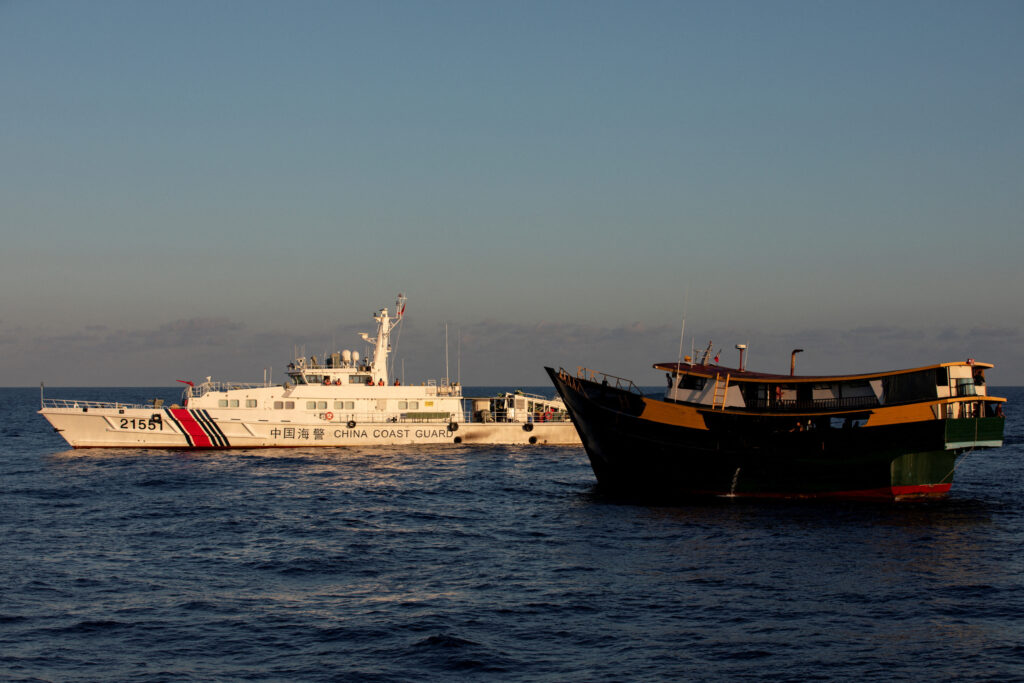It takes a lot for anything to make the Taiwan Strait no longer seem the most dangerous place in Asia, but a set of tiny rocks and coral reefs in the South China Sea is once again punching above its weight in this regard.
Manila has taken the legal high ground. The 2016 decision by the Permanent Court of Arbitration (PCA) in the Hague, though making no ruling on sovereignty, stated clearly that whatever claims China made to the sea based upon its famous ‘nine-dash’ line delineating what it calls its ‘historic rights’ to the South China Sea had no basis under the UNCLOS.
The rest is history. The Duterte administration wasted its opportunity to build a diplomatic coalition within ASEAN that was the best hope of steering China towards compliance with the 2016 ruling, with the bilateral dispute remaining unresolved.
With President Ferdinand Marcos Jr. now in a protracted falling out with the Duterte political clan, all his political incentives point towards repudiating Duterte’s approach to the South China Sea issue by more forcefully asserting the Philippine maritime claims.
Manila is between a rock and a hard place about how to respond to its territorial disputes with China. Go it alone, and it faces the prospect of bilateral negotiations with a more powerful adversary that sees the issue as a matter of national credibility and — if hypotheses about Beijing’s plans to make the South China Sea a haven for its nascent submarine-based nuclear deterrent are right — a national security priority.
At the same time, by dragging its security patron the United States into the matter, it risks quickening a dynamic whereby Beijing — cursed by all great powers’ inability to empathise with the anxieties of smaller neighbours — comes to see its neighbours’ pushing back against its claims as part of a US strategy of containment-via-proxy.
One can’t blame Marcos’ administration for taking the second option, given the widespread perception in Manila that China isn’t interested in good-faith negotiations to de-escalate the situation in Scarborough Shoal and the Spratlys.
But the upshot for the whole region is that the more the Philippines leverages its alliance with Washington, the greater incentive China has to test US commitment to its treaty commitments to the Philippines in a cycle of brinkmanship that undermines the stability of the whole region, and make it harder for ASEAN, for instance, to do what it clearly must and call more vocally on China to respect the 2016 PCA ruling.
That these two sub-optimal options loom large in Manila’s policy choices speak to a lack of institutional avenues through which it might leverage the collective political influence of Asia’s small and middle powers, who together have an urgent interest in holding China accountable to rules that protect their interests — but who individually have little incentive to do anything that antagonises Beijing or join with Manilla in dragging the United States into this particular dogfight.
As the South China Sea crisis illustrates vividly, Asia’s small and medium powers need better options than being subject to the power imbalances inherent in their bilateral relations with China if and when things go awry, or exacerbating China’s paranoia about containment by dragging their extra-regional patron, the United States, into the mix.
Joseph Liow takes up this theme in this week’s lead article, outlining the particular interest Southeast Asia has in building regional unity in the face of great-power competition. Such unity, he writes, ‘is paramount in Southeast Asia’s response to these challenges. Despite the different strategic outlooks of Southeast Asian states, there needs to be a realisation that against the backdrop of great power rivalry, all countries involved need to look beyond national interests to discern the common interests that they share’.
ASEAN unity needs to find its expression in institutions and the like-minded cooperation they facilitate. The ASEAN-centred regional architecture is under-utilised not just as a place for the United States and China to work out their bilateral differences under the cover of multilateral engagement, but also as a platform for the articulation of the collective interests of the Asian majority in an open and pluralistic order.
As Liow observes, ‘[b]ecause of the importance of the economic order for Southeast Asia, the changing geoeconomic landscape — yet another function and extension of great power rivalry — poses challenges to which the region will have to respond’, with the Biden administration trying to save its political bacon before November’s elections by embracing Trump’s trade war with China in ways that make all of China, the United States and the whole world less prosperous in the not-too-long run.
A key part of this apparatus of regional unity-building is RCEP which, at a time when the prestige of globalisation is collapsing in key Western capitals, can be this region’s platform for defending economic openness.
The EAF Editorial Board is located in the Crawford School of Public Policy, College of Asia and the Pacific, The Australian National University.

